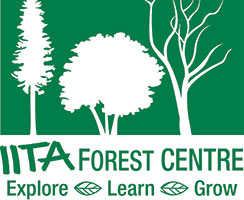25 Oct Interview Excerpts with Forest Center Head, Adewale Awoyemi, on Olokemeji Reforestation Project
Ms Folake: Tell us about the Olokemeji community sir.
Mr Adewale: The community is blessed with the Olokemeji Forest Reserve, which is over 5000 ha all together. The Ogun river runs through the Olokemeji Forest Reserve, a major river beneficial to both the local community and adjoining communities. It is a small village but blessed with natural resources such as forests and the Ogun river. The river is a source of income to the local community as we find most of them are fishermen.
Ms Folake: Please tell us about the Olokemeji Reforestation Project?
Mr Adewale: The Olokemeji village is located in Ogun State, about 40km from the IITA campus in Ibadan. The community hosts the Olokemeji Forest Reserve where we are conducting the project. The project is a community-based conservation approach, which makes the project driven by the rural households.
Ms Folake: Who is the sponsor of this project?
Mr Adewale: The project is sponsored by the Nigerian Breweries Plc. A responsible corporate body conscious about environmental sustainability. They have different plans for biodiversity conservation for the environment from which they take mineral resources which they use for their product.
Ms Folake: What are the interests of both IITA and the sponsor of this project?
Mr Adewale: The donor is keen about ameliorating communities that are water-stressed. The Nigerian Breweries is interested in conserving the Ogun river and protecting it from drying up. One sure way to do this is to protect the watershed, the forests and the tree cover that protects the Ogun river.
The Forest Center of IITA is responsible for biodiversity monitoring within the campus and also beyond it. We are conscious about what is locally adaptable. We incorporate local communities and also species that are adaptable to local soils and climate of Nigeria.
Ms Folake: How well did the community members receive this project?
Mr Adewale: We’ve conducted activities for 5 months now, since March 2021. And in the last 5months, we have employed about 60 people from this local community to carry out the tree-planting activities. The project is driven by the local community who are highly enthusiastic in carrying out their duties.
Ms Folake: What other benefits would this reforestation project afford the community members, aside the direct benefits of tree planting?
Mr Adewale: The Ogun river is a source of domestic and industrial water use to communities and other companies depending on it. If you protect the forest, you are invariably protecting the water; if you protect the water, you are invariably enhancing the fish life; and invariably improving the economic status of people in and around the community.
We plan to increase the total number of people employed for the reforestation project as time goes by. The people working there were amicable recommended by the traditional rulers and chiefs, showing a good relationship between us and them. In addition to this, over 100 rural members will be trained in alternative ventures for income generation.
Ms Folake: How long would the community members enjoy this project and how long would the project run?
Mr Adewale: Our plan is for our work in Olokemeji to be sustainable even after the project duration. The entire Olokemeji Forest reserve is about 5000ha. But we are proposing reforestation for the highly degraded area covering about 600ha. The project is proposed to run for 10years, and it would be in 2 phases.
For sustainability, we are engaging the local community so they see the project as theirs, making it a potential for eco-tourism in the nearest future. We set up School Conservation Clubs in 3 schools that surround the local community. We train school children, who are future leaders about environmental conservation so they are conscious about the environment and the future. We engage them in the tree-planting campaign so each child grows up to become environmentally responsible in the future.
They also get to enjoy the pride of referring to a seedling planted some 25 years ago which would have grown into a mighty tree, years later when they return to check the trees they’ve planted. They would grow to become future ambassadors of biodiversity conservation.

